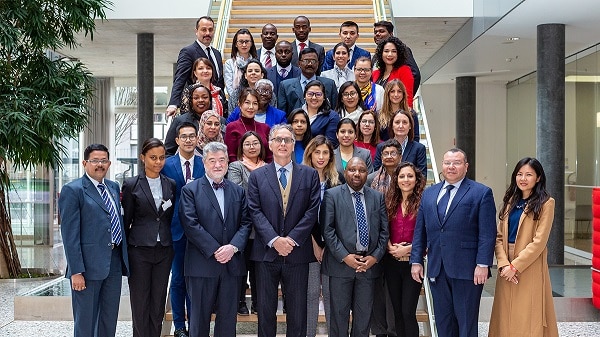Concluye en Ginebra el 11º curso avanzado OMC-OMPI sobre propiedad intelectual para responsables de la formulación de políticas
Del 11 al 22 de marzo de 2019 tuvo lugar en Ginebra un curso avanzado de dos semanas de duración sobre propiedad intelectual para funcionarios gubernamentales, organizado conjuntamente por la OMC y la Organización Mundial de la Propiedad Intelectual (OMPI).

The course was the eleventh in an annual series of WTO-WIPO courses. Twenty-nine officials from developing countries participated in the course. This capacity building exercise brought together government officials with a strong background in intellectual property from a diverse range of countries and legal systems.
Mario Matus, Deputy Director General at WIPO, and Xiaozhun Yi, WTO Deputy Director-General, participated in the opening and closing ceremonies, together with Antony Taubman, Director of the Intellectual Property, Government Procurement & Competition Division at the WTO. They addressed the global IP framework and its interaction with public policy issues, emphasizing the importance of this capacity building exercise which responds to the growing demand within developing countries for enhanced awareness of intellectual property issues.
Government officials were updated on IP law instruments and related multilateral developments, and were able to exchange information, experience and ideas on IP matters among themselves and with the WIPO and WTO Secretariats. The course was designed to equip participants with the tools to develop and apply domestic policies that contribute to the IP development process. The programme provided a platform for dialogue and partnership among peers that will continue beyond the two-week course, putting national experiences and advice on best practices and strategies at the centre of the discussion.
Participants and topics
Participants were selected from developing countries and their participation was financed by WIPO and WTO. The selection process considered IP expertise and knowledge and sought to ensure geographical and gender balance. Nineteen of the participants were women.
Participants were from: Albania; Argentina; Azerbaijan; Barbados; Brazil; Chile; China; Ecuador; Egypt; Guyana; India; Israel; Kyrgyz Republic; Liberia; Malaysia; Mauritius; Mexico; Moldova; Nepal; Nigeria; Peru; Philippines; Seychelles; Singapore; South Africa; Thailand; Viet Nam and Zimbabwe. Expert presentations, discussion sessions, panel deliberations, and practical exercises took place during the two weeks of the course covering a wide range of subjects, including:
- law, policy and development dimensions of intellectual property (IP);
- interplay among artificial intelligence, intellectual property and economic development;
- international treaties and conventions governing intellectual property;
- IP and its relation to economic development, international trade, public health, biotechnology, climate change, biodiversity, and competition policy;
- current international practices in copyrights, trademarks, industrial designs, geographical indications, patents and trade secrets;
- WTO Dispute Settlement System and the Agreement on Trade-Related Aspects of Intellectual Property Rights (TRIPS);
- recent developments in WIPO and the WTO on genetic resources, traditional knowledge and traditional culture expressions;
- IP and e-commerce – a discussion on regulatory responses at the international level;
- IP and arbitration/dispute settlement mechanisms.
















